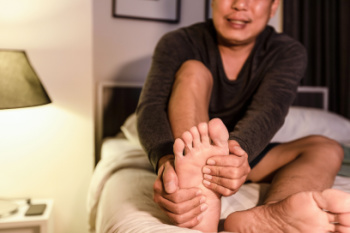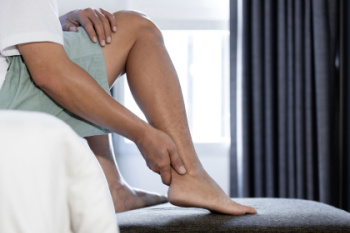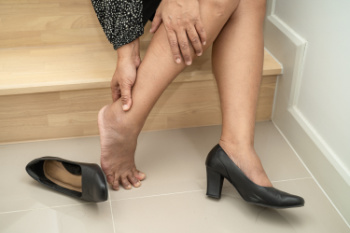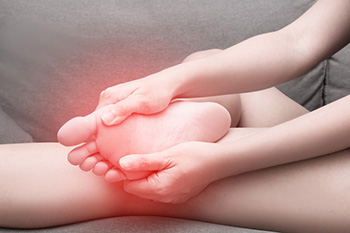Connect With Us
Blog
Items filtered by date: July 2025
Simple Foot Exercises That Support Balance and Comfort

Strong, flexible feet are important for overall stability and daily comfort. Simple foot exercises can help improve balance, prevent injury, and ease discomfort caused by tight muscles or weak foot structures. Activities like toe curls, heel raises, and rolling a ball under the arch can strengthen muscles and improve circulation. Stretching the toes and calves can also help relieve tension that may contribute to common foot problems. Practicing balancing on one foot builds stability and can reduce the risk of falls, especially in older adults. Over time, these exercises support better posture and may ease pressure on the ankles, knees, and hips. Making foot exercises part of your routine can help maintain healthy movement and reduce discomfort. If you experience ongoing pain or have difficulty with balance, it is suggested you schedule a visit with a podiatrist for evaluation and guidance.
Exercising your feet regularly with the proper foot wear is a great way to prevent injuries and build strength. If you have any concerns about your feet, contact Stephanie Oexeman, DPM from Oexeman Foot and Ankle, PLLC. our doctor can provide the care you need to keep you pain-free and on your feet.
Exercise for Your Feet
Exercise for your feet can help you gain strength, mobility and flexibility in your feet. They say that strengthening your feet can be just as rewarding as strengthening another part of the body. Your feet are very important, and we often forget about them in our daily tasks. But it is because of our feet that are we able to get going and do what we need to. For those of us fortunate enough to not have any foot problems, it is an important gesture to take care of them to ensure good health in the long run.
Some foot health exercises can include ankle pumps, tip-toeing, toe rises, lifting off the floor doing reps and sets, and flexing the toes. It is best to speak with our doctor to determine an appropriate regimen for your needs. Everyone’s needs and bodies are different, and the activities required to maintain strength in the feet vary from individual to individual.
Once you get into a routine of doing regular exercise, you may notice a difference in your feet and how strong they may become.
If you have any questions, please feel free to contact our office located in Chicago, IL . We offer the newest diagnostic and treatment technologies for all your foot care needs.
Peripheral Neuropathy and Its Impact on Foot Health

Peripheral neuropathy, which results from damage to the peripheral nerves, often affects the feet. It can be caused by diabetes, infections, injuries, vitamin deficiencies, or exposure to toxins. This condition disrupts nerve signals, leading to symptoms such as numbness, tingling, burning, weakness, or sharp pain in the feet. Risk factors include chronic illness, alcoholism, certain medications, and genetic predisposition. Peripheral neuropathy can lead to balance issues, ulcers, or unnoticed injuries due to reduced sensation. A podiatrist can help by evaluating nerve function, treating foot complications, and recommending protective strategies. If you are experiencing changes in foot sensation or unexplained pain, it is suggested that you consult a podiatrist to manage symptoms and offer relief solutions for this condition.
Neuropathy
Neuropathy can be a potentially serious condition, especially if it is left undiagnosed. If you have any concerns that you may be experiencing nerve loss in your feet, consult with Stephanie Oexeman, DPM from Oexeman Foot and Ankle, PLLC. our doctor will assess your condition and provide you with quality foot and ankle treatment for neuropathy.
What Is Neuropathy?
Neuropathy is a condition that leads to damage to the nerves in the body. Peripheral neuropathy, or neuropathy that affects your peripheral nervous system, usually occurs in the feet. Neuropathy can be triggered by a number of different causes. Such causes include diabetes, infections, cancers, disorders, and toxic substances.
Symptoms of Neuropathy Include:
- Numbness
- Sensation loss
- Prickling and tingling sensations
- Throbbing, freezing, burning pains
- Muscle weakness
Those with diabetes are at serious risk due to being unable to feel an ulcer on their feet. Diabetics usually also suffer from poor blood circulation. This can lead to the wound not healing, infections occurring, and the limb may have to be amputated.
Treatment
To treat neuropathy in the foot, podiatrists will first diagnose the cause of the neuropathy. Figuring out the underlying cause of the neuropathy will allow the podiatrist to prescribe the best treatment, whether it be caused by diabetes, toxic substance exposure, infection, etc. If the nerve has not died, then it’s possible that sensation may be able to return to the foot.
Pain medication may be issued for pain. Electrical nerve stimulation can be used to stimulate nerves. If the neuropathy is caused from pressure on the nerves, then surgery may be necessary.
If you have any questions, please feel free to contact our office located in Chicago, IL . We offer the newest diagnostic and treatment technologies for all your foot care needs.
Causes and Symptoms of an Achilles Tendon Tear

An Achilles tendon tear occurs when the thick cord that connects the calf muscles to the heel is overstretched and either partially or fully rips. Achilles tendon tears can be caused by sudden movements, such as pushing off the foot quickly, changing direction while running, or tripping while walking. Sports like tennis and basketball, which involve fast stops and turns, are also common causes. While people between the ages of 30 and 50 are especially at risk, this injury can affect younger athletes as well. Symptoms include a sharp pain in the lower leg or ankle, a snapping sound at the time of injury, difficulty walking, and weakness when trying to lift the heel. There may be bruising or swelling near the back of the ankle. A podiatrist can examine the tendon, confirm if it is torn, and recommend treatment. Depending on how severe the tear is, surgery may be needed. If you have injured your Achilles tendon, it is suggested that you schedule an appointment with a podiatrist for an exam and appropriate treatment options.
Achilles tendon injuries need immediate attention to avoid future complications. If you have any concerns, contact Stephanie Oexeman, DPM of Oexeman Foot and Ankle, PLLC. our doctor can provide the care you need to keep you pain-free and on your feet.
What Is the Achilles Tendon?
The Achilles tendon is a tendon that connects the lower leg muscles and calf to the heel of the foot. It is the strongest tendon in the human body and is essential for making movement possible. Because this tendon is such an integral part of the body, any injuries to it can create immense difficulties and should immediately be presented to a doctor.
What Are the Symptoms of an Achilles Tendon Injury?
There are various types of injuries that can affect the Achilles tendon. The two most common injuries are Achilles tendinitis and ruptures of the tendon.
Achilles Tendinitis Symptoms
- Inflammation
- Dull to severe pain
- Increased blood flow to the tendon
- Thickening of the tendon
Rupture Symptoms
- Extreme pain and swelling in the foot
- Total immobility
Treatment and Prevention
Achilles tendon injuries are diagnosed by a thorough physical evaluation, which can include an MRI. Treatment involves rest, physical therapy, and in some cases, surgery. However, various preventative measures can be taken to avoid these injuries, such as:
- Thorough stretching of the tendon before and after exercise
- Strengthening exercises like calf raises, squats, leg curls, leg extensions, leg raises, lunges, and leg presses
If you have any questions please feel free to contact our office located in Chicago, IL . We offer the newest diagnostic tools and technology to treat your foot and ankle needs.
Do You Suffer From Painful Feet?
Systemic Conditions That Can Lead to Foot Issues

The health of your feet can often reflect what is happening elsewhere in the body. Certain medical conditions that affect multiple systems can also cause foot-related symptoms. Diabetes is one of the most well-known, often leading to nerve damage, circulation problems, and delayed healing. Autoimmune diseases such as lupus or rheumatoid arthritis can cause joint pain, swelling, and changes in foot structure. Kidney or liver disease may lead to fluid retention, causing swelling in the feet and ankles. Additionally, neurological disorders can affect muscle control and sensation, sometimes leading to imbalance or unusual wear on the feet. Even conditions like peripheral artery disease or thyroid dysfunction may contribute to discomfort or changes in the appearance of the feet. Paying attention to new or ongoing symptoms can help with early detection of a broader issue. If your feet are showing signs of an underlying condition, it is suggested that you speak with a podiatrist for further guidance and care.
When dealing with systemic disease of the feet, it is extremely important to check the affected areas routinely so that any additional problems are caught quickly. If you have any concerns about your feet and ankles contact Stephanie Oexeman, DPM from Oexeman Foot and Ankle, PLLC. our doctor will assist you with all of your podiatric needs.
Systemic Diseases of the Feet
Systemic diseases affect the whole body, and symptoms usually are displayed in the feet. This condition can make a patient’s ability to walk unbearable. Systemic diseases include gout, diabetes mellitus, neurological disorders, and arthritis.
Gout – is caused by an excess of uric acid in the body. Common symptoms include pain, inflammation, and redness at the metatarsal/phalangeal joint of the base big toe. Gout can be treated by NSAIDs to relieve pain and inflammation, and other drugs that lower the acid levels in the body.
Diabetes mellitus – is an increase in the level of blood sugar that the body cannot counteract with its own insulin. Failure to produce enough insulin is a factor in Diabetes.
Diabetes of the Feet
Diabetic Neuropathy – may lead to damaged nerves and affect the feet through numbness and loss of sensation.
Peripheral Vascular Disease – can restrict the blood flow to the feet, and often times lead to amputation of the feet.
If you have any questions please contact our office located in Chicago, IL . We offer the newest diagnostic and treatment technologies for all your foot and ankle needs.
The Impact of Poorly Fitting Shoes on Foot Health

Wearing shoes that do not fit properly is a leading cause of foot pain as well as long-term complications. Tight or loose footwear can lead to corns, calluses, and even foot deformities, such as bunions or hammertoes. Over time, discomfort may limit mobility and discourage regular activity. Ill-fitting shoes can also worsen conditions like peripheral neuropathy by adding pressure and irritation to sensitive areas. A podiatrist can examine your foot shape, assess any damage, and recommend properly fitting shoes or custom orthotics to relieve pain and prevent further issues. If you have developed foot pain from wearing the wrong type of shoes, it is suggested that you schedule a visit with a podiatrist who can treat various foot conditions and offer the right guidance for your specific needs.
Foot Pain
Foot pain can be extremely painful and debilitating. If you have a foot pain, consult with Stephanie Oexeman, DPM from Oexeman Foot and Ankle, PLLC. our doctor will assess your condition and provide you with quality foot and ankle treatment.
Causes
Foot pain is a very broad condition that could be caused by one or more ailments. The most common include:
- Bunions
- Hammertoes
- Plantar Fasciitis
- Bone Spurs
- Corns
- Tarsal Tunnel Syndrome
- Ingrown Toenails
- Arthritis (such as Gout, Rheumatoid, and Osteoarthritis)
- Flat Feet
- Injury (from stress fractures, broken toe, foot, ankle, Achilles tendon ruptures, and sprains)
- And more
Diagnosis
To figure out the cause of foot pain, podiatrists utilize several different methods. This can range from simple visual inspections and sensation tests to X-rays and MRI scans. Prior medical history, family medical history, and any recent physical traumatic events will all be taken into consideration for a proper diagnosis.
Treatment
Treatment depends upon the cause of the foot pain. Whether it is resting, staying off the foot, or having surgery; podiatrists have a number of treatment options available for foot pain.
If you have any questions, please feel free to contact our office located in Chicago, IL . We offer the newest diagnostic and treatment technologies for all your foot care needs.


